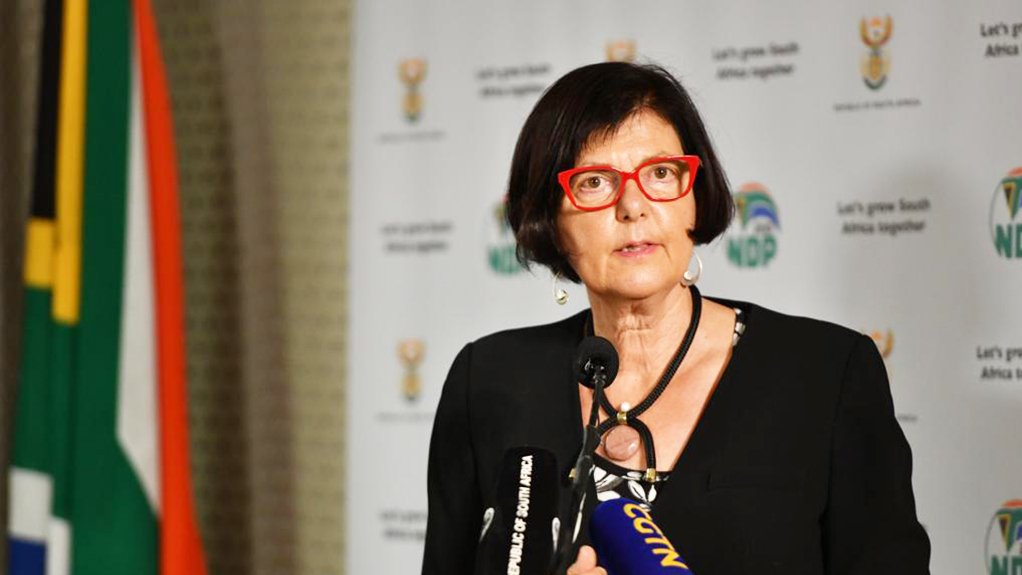Forestry, Fisheries and the Environment Minister Barbara Creecy reports that public consultations on the country’s Just Energy Transition Investment Plan (JET-IP), which was unveiled only days before the start of COP27, should be concluded by mid-February.
In a briefing following the conclusion of the climate negotiations that took place in Sharm el-Sheikh, Egypt, Creecy said that the Presidential Climate Commission would help facilitate the consultations, which she said would “fundamentally assist us in shaping the implementation plan”.
Responding to criticism over the lack of domestic consultation ahead of the plan’s presentation, in Egypt, by President Cyril Ramaphosa to the Just Energy Transition Partnership (JETP) countries of Germany, France, the European Union, the US and the UK, she stressed the JET-IP required Cabinet approval before it could be released for consultation.
She also stressed that the Cabinet had also endorsed the Just Transition Framework, which committed government to refrain from “making decisions around transitions without involving workers and communities in vulnerable sectors”.
“On the Friday [November 4] before the opening of COP27, the President handed the JET-IP over to the Presidential Climate Commission to facilitate engagements and we are discussing a process that would probably conclude mid-February,” Creecy said.
The JET-IP outlines investments valued at a combined R1.5-trillion that should be made in the electricity, electric vehicle and green hydrogen sectors over the five years from 2023 to 2027 to enable South Africa to meet its climate commitments, stabilise energy supply and cushion vulnerable workers and communities.
The plan has been endorsed by all the leaders of the JETP countries, which pledged $8.5-billion to support South Africa’s JET-IP at COP26, which was held in Glasgow, Scotland in 2021.
Besides emphasising that South Africa required far more than the $8.5-billion on offer, Creecy reported that Ramaphosa also used his meetings in Egypt to reinforce that South Africa required highly concessional loans and grants to support its transition.
“He also indicated that the government of South Africa will now employ a project manager who will be responsible to implement the JET-IP as soon as the Presidential Climate Commission concludes its work on stakeholder consultations.”
Hitherto, the Presidential Climate Finance Task Team, headed by Daniel Mminele, had overseen the drafting of the JET-IP, which had already resulted in France’s Agence Française de Développement (AFD) and Germany’s Kreditanstalt für Wiederaufbau (KfW) advancing loans of €300-million apiece to the National Treasury.
Both loans had a 20-year maturity, with the AFD loan carrying an interest rate of 3.6%, and the KfW loan 3%. In a recent statement the National Treasury estimated that raising an equivalent loan in the market would have attracted an interest rate of 8.9%.
Asked whether any progress had been made on the side-lines of COP27 in attracting additional members to the JETP and expanding the funding pool for the JET-IP, Creecy confirmed that she had held several bilateral meetings with other prospective partners.
“I'm not in a position at this stage to announce anything concrete, but I can say there is interest and we do expect, in due course, that we will be able to announce the inclusion of further partners.”
The JET-IP would also feature as part of Ramaphosa’s State visit to the United Kingdom of Great Britain and Northern Ireland; the first to be hosted by King Charles III and a visit that includes official bilateral talks with Prime Minister Rishi Sunak.
In her overview of COP27, meanwhile, Creecy indicated that South Africa viewed the agreement on the establishment of a fund on loss and damage as a key milestone in light of 30 years of disagreement on the issue.
She said a transitional committee had been set up to work on the modalities of the fund with a view to taking a decision at COP28 in 2023.
“COP27 also emphasised the need for increased momentum to reform the multilateral development banks and international financial institutions and called on the shareholders of these institutions to take decisive action to scale-up climate finance in 2023 and make their institutional arrangements fit for purpose.”
However, she expressed disappointment at the lack of progress in operationalising a ‘Global Goal on Adaptation’, in particular South Africa’s call for a target to increase the resilience of global populations by 50% by 2030.
There had been “incremental progress” on moving forward to the establishment of the new collective finance goal in 2025. But Creecy said the goal still fell short of action needed to meet developed countries’ obligations, especially in the context of the failure of developed countries to meet the $100-billion goal by 2020.
She also defended the participation of large emitters as part of the South African Pavilion at COP27, where more than 50 events were hosted.
“If you think that we can pull off a climate transition without involving the emitters, then I don't know who you think is going to reduce the emissions.
“And if you think this can be done without finance, then what you're saying is the South African taxpayers must foot the bill.
“So I think the intention of the pavilion is to give the big emitters the opportunity to meet global partners, to meet investors and to take forward their commitment to achieving net-zero by 2050,” the Minister argued.
EMAIL THIS ARTICLE SAVE THIS ARTICLE ARTICLE ENQUIRY
To subscribe email subscriptions@creamermedia.co.za or click here
To advertise email advertising@creamermedia.co.za or click here











